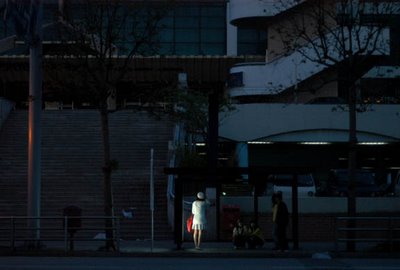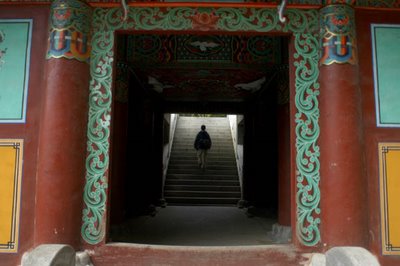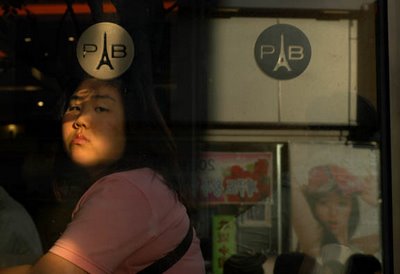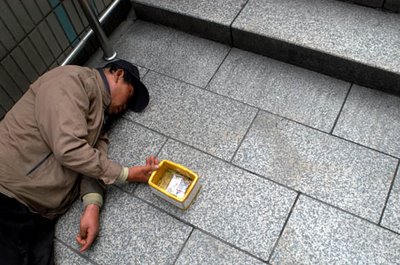
Light. It's a strange, miraculous phenomena. Stranger still is light's uncanny analogy to a sound or water wave. Energy travels in waves, no matter what medium it might be traveling through. I tried explaining this to my Special Class last Monday, and too my great surprise, they got it. We talked about pigments, reflection, refraction and even the visible spectrum.
Wait a minute, you're thinking. How do you explain the foundations of wave theory to a group of thirteen-year-old Koreans using their second language? Are you crazy?
Bare something in mind. These are not typical ESS students. They're Special.
When I first saw the "S.C." on my assignment sheet lo these many months ago, my immediate thought was that I had just been handed a group of mentally retarded children. While I was in public school, 'Special Class' was bureaucratic doublespeak for the children who were mentally handicapped. They had their own classroom, their own teacher, their own lunch period, and my only exposure to them came after school while waiting for my ride or at Friday night football games. They sat with their teacher in their wheelchairs at the top of the handicapped access ramp at Decatur High stadium and took in the game.
However, at ESS Best Jr. Academy, 'Special Class' refers to children who have lived abroad in English-speaking countries for an extended period of time. Naturally, they would be far, far ahead of the other children in the academy, and many of them are indeed great English speakers. Soon "Doo boo" Jeong. Ju "Chun je" Young. Ji "Wiz" Sun. These are all great English speakers in comparison to the bulk of students at ESS. This does not mean they are smarter than all the other kids at ESS. In all honesty, I consider the children of Advanced Three to be my brightest students. But the students of Special Class have something no one else can boast: Immersion in an English-speaking culture.
By enrolling their children in Special Class, the parents of these wayfaring youngsters hope to maintain their child's strong conversational and comprehension skills. Indeed, three times a week the six children in Special Class receive a full hour-and-a-half native speaker smackdown from Mr. Jones and Mr. Averill and Mr. Northcott. That's a whole lot of English!
However, the curriculum for the class has usually been cobbled together from texts selected on a lark. For most of the first four months I taught Special Class, I had no curriculum. I taught from the hip, so to speak. We built parachutes, read about the Japanese whaling industry and played games. The student's high level of English comprehension made teaching a little easier, and they could wrap their minds around advanced material that was better suited to their interests and age bracket.
Around the end of February, Hye-ran decided it was high time the native speakers adhere to a curriculum. She took us to the English bookstore and we selected texts in the areas of social studies, science, conversation and grammar. She made us write up a syllabus for the month of March and she handed copies to the students. It was a lot more work than I had ever had to do for Special Class, and I grumbled and griped the whole time. I liked the class partly because it allowed me the opportunity to try new things and be spontaneous.
Hye-ran quit her job in April to pursue other interests, leaving the task of managing Special Class to Soo-hyun, who was (and still is) relatively new to the organization. Though it probably has nothing to do with her, I haven't had to make another syllabus since then. The school's interest in Special Class waxes and wanes with the vaguely predictable behavior of the stock market, and my instinct tells me that the movements are cued to the quality and size of the class itself.
One of the problems facing Soecial Class is that some of the children don't actually speak English as well as advertised. This isn't nessiarily anyone's fault, but rather the result of a slipshod admission process levered by the school's bottom line.
One day, a month or so after arriving last fall, Gavin was pressed into a hasty interview of two potential students for admission to Special Class. Gavin was given only a few minutes to prepare and even less time to actually conduct the interview. The students, who were very nervous and scared of embarrassing themselves and their parents, were unresponsive, and Gavin had a hard time sizing up their English-speaking capabilities.
The two applicants were twin girls: Eun-hee and Eun-jeong. They had studied in an English academy while living in China, and they were reputed to be excellent English speakers. For the first month, neither Eun-hee nor Eun-jeong said a thing. In my class, they sat in the front row and stared at me like I was the living incarnation from a fairytale and they flatout refused to answer any of my questions. Gavin's experience was even more perplexing. One of the girls looked "like she was going to cry at any minute," he reported.
More students entered Special Class under the radar partially due to the stunted, frankly extemporaneous, nature of the interview process. Gavin theorized that the students probably prepared answers in advance of the interview. The questions we asked were very straitforward and highly predictable. What's your name, how old are you, where did you study English, etc. Someone with an English phrase book and an hour to kill could probably come armed to impress.
My own response to this tactic was to ask the children to read from what I thought would be a difficult text, but this proved an easily surmountable obstacle. English and Hangul are both phonetic alphabets, and thus reading comes easy to strangers of either language. My technique only proved how well they could pronounce English. It said nothing about their level of comprehension.
Gavin and I tried retooling our interview questions so that we could better gauge the student's ability to form original thoughts in English. In the case of one my newest students, Ye-ji, this proved devestatingly effective.
While walking down the hallway with her parents, I put Ye-ji at ease by asking the easy, predictable questions I'm sure she expected. This made her smile, and her practiced, casual replies visibly pleased her parents who were following behind us. Ye-ji had spent two years in New Zealand with her mother, specifically to learn English I was told, and her father (some variety of businessman) was fluent in English. The language was obviously an important ingredient in their lives.
During the interview, I left the phrasebook behind and played hardball. So you're thirteen years old? What did you do on your last birthday party? How did you like New Zealand? Where did you live? Were the people nice to you? What is the difference between Korean school and the academy in New Zealand? I varied the difficulty of my questions, trying to gauge Ye-ji's ability to digest, comprehend and then react to the inquiries.
Over the course of the five-minutes I had been allotted for the interview, all of the wattage drained from Ye-ji's smile, and her actual level of conversational ability was set in stark contrast to her reported background. Though I could detect a high level of comprehension in her eyes, the responses to my questions were far from that of a near-native speaker. Her voice couldn't keep up with her ears. You might say that she heard more than she could speak. My report to Soo-hyun was not positive, and I have to admit that I did not recommend Ye-ji for admission to Special Class.
The following Monday Ye-ji was sitting behind Ju-yeong when I walked into room 307, a fat green science book on her desk and a confused, timid look in her eyes. Money speaks louder than English in ESS Best Jr. Academy, apparently.
Throughout my short history with Special Class most marginal speakers, such as Ye-ji, get weeded out after a month or two as their true level of English becomes grossly apparent. As I mentioned before, the size and chemistry of the class has varied according to this odd pattern. Throughout March Hye-ran repeatedly inquired of Gavin and I about the twins as well as other new additions to Special Class. In all truth, some of these new students were stellar English speakers. Others obviously didn't live up to expectations, and were eventually dismissed by Hye-ran or yanked out of ESS by their parents. From the beginning of March to the present the class size dropped from its high of eleven in March to its current roster of six children.
Ye-ji is still in the game, as are the Twins, who are now a much more vocal ingredient. I have nicknamed them Hee and Jeong (as both of their 'first' names are Eun), and I am slowly getting to know them better. Through Hye-ran, Gavin discovered that the Chinese academy where the twins studied actually discouraged the highly interactive, free-speaking style of learning that Gavin and I encourage. They didn't speak up in class because such behavior was punished in China. Once they began to notice how the American and Austrailian-educated students around them were raising their hands and responding to the teacher, I imagine the Twins felt safer. Now they are two of my best students.
I can only hope the same for Ye-ji, who is still in the '"dormant" stage. I like her. I detect a great deal of intelligence and thoughtfulness in her eyes, and I hope she gets rid of the butterflies in her stomach and emerges from her cocoon before Soo-hyun or her folks get fed up and punches her ticket out of ESS. Either way, Special Class will remain a wild card in my weekly rounds.
Buddha celebrated a birthday Friday. He turned 2550 years old. I'd say he's a 'young' 2550. He sure has a lot of thoughtful followers.

The temple next to ESS (which actually owns our building) was alive with people eating bibimbop and worshipping. There were many statues of Buddha, one of which people would pour what looked like oil over. A monk was chanting the whole time I was there, a strange, ancient sound.
Gavin and I had Friday off due to the Sukatanshinil holiday. We got an early start and climbed over Bongnaesan into the local temple, filled with lanterns hung with prayers, to see what this "Buddhist Christmas" was all about.


The temple on Bongnaesan had a giant stone pagoda covered in carvings. People bowed before them before making their way into the temple's main hall.

A couple of ajummas welcomed people into the temple. They were dressed in beautiful hanbok and were very friendly.

There was lots of bowing.

The following week came and went with little fanfare.
Someone asked me last week why my nickname is Notes, and I bet there are some readers of my blog who wonder the same thing. Let me preface this by going backwards in time.
Ever since I joined the photography staff at the Chattanooga Times Free Press as an intern in the dawn of my career, I have carried a notepad. Besides being a critical tool in gathering information for the photos I took, I found the notepad an equally good medium to cover the ongoing story of my life as well.
Thumb through any of those old, sweat-stained notepads and in and among the scribbled names of people I photographed on assignment you will find scraps of poetry and prose, grocery lists, story ideas, reactions to events in my life, financial notes and various to-do lists. There is a box at my parents' house filled with these old notepads. I am literally writing my autobiography one tiny notebook at a time.
Of course, when I started hiking the Appalachian Trail in March of 2003, I had a little black, spiral-bound notepad tucked into a pocket within easy reach. Over the course of that six-month journey, I ran through some two dozen such notepads, mailing them back to The Chattanooga Times Free Press when every last page was filled with scribblings from interviews, photo credits, and observations. The newspaper condensed the information into a ten-part series that ran every third Sunday or so from March till October.
Almost everyone who hikes the Appalachian Trail picks up a nickname, or in Trail parlance, a "Trailname." I hiked with people with names like Space Monkey, Liteshoe, Itchyfoot, AWOL, Commander-in-Chief, Tang and Stringbean. To this day, I cannot recall, or in some cases never learned, many of their given names. If I saw Space Monkey tomorrow on the way to work, that would be the name I would put to his face. That would be the name I would yell across the busy streets of Nampo-dong. Space Monkey.
I should also add that most trailnames are coined by other hikers, and they reflect some defining aspect of the individual being named. Stringbean, for example, was ludicrously thin. Itchyfoot would wake up every morning at the crack of dawn. Tang was fond of drinking, well, you guessed it: Tang.
Some people were often the beneficiaries of horribly unfortunate trailnames. One young man, upon being discovered cooling off his hiking-chaffed crotch in a creek upstream from a campsite was instantly and irreversibly christened "Ball Washer" by his comrades. I myself narrowly avoided garnering the odious trailname "Bad Joke."
A Canadian hiker got fed up with my daily stream of poorly-crafted witticisms and slyly proposed the name over dinner in a shelter in North Carolina. A few people grumbled their ascent, citing a damning number of horrificly bad jokes I had told that day, and it was only after a prolonged filibuster that I managed to at least table the idea.
The next morning I think I cracked another awful play on words, something about bugs and breakfast cereal, and after everyone had stopped groaning, the Canadian took the opportunity to reexamine the "Bad Joke" idea from the previous night. If memory serves, the joke had indeed been a real stinker, and I probably deserved the moniker.
I realized where the conversation was leading, and I protested mightily.
"Well, you need a trail name," she pointed out with a hint of sarcasm. "Do have a better idea?"
I didn't. I had been thinking about it for weeks, and nothing seemed to fit. Ever since I first interviewed someone at Springer Mountain, people had been trying to pin me with various names pertaining to journalism. I tried on Cronkite, Shutterbug and Sleuth, but found them all lacking. I wasn't anything like the iconic news anchor (in fact, I maintain a healthy disrespect for television in general and televised news in particular), Shutterbug seemed to imply a low degree of skill with a camera, and Sleuth didn't fit because I was in no way an investigative reporter.
"How about 'Notes," the Canadian's hiking partner suggested. "Every time I see him, he's always writing in that tiny notebook." She pointed to a pouch on my waist strap where I kept the notepad.
There was a sort of contemplative silence as the four or five hikers gathered under the lean-to chewed on the suggestion. Personally, the name "Notes" wasn't perfect, but it was a damn sight better than "Cronkite" or "Bad Joke."
"Hey, I like that name," I cheerfully chimed in, breaking the silence. People began to nod. The Canadian girl cocked a disapproving eyebrow at me as she realized I had dodged a much-deserved bullet. She continued to call me "Bad Joke" for a few days thereafter, even though Notes had become my generally accepted trailname. Only after I promised to stop telling them around her did she declare a ceasefire.
The 'Notes' name grew on me as I hiked, and the pile of notepads at the Times Free Press grew and grew. Yellow ones, long ones, plastic ones, waterproof ones, sweatstained, bloodstained, foodstained notebooks filled a tiny box on a desk in Chattanooga. By the time I returned home and began searching for a job, notebooks found a permanent residence in my back right pocket.
I have owned all brands and builds of notebooks. Spiral bound, glue bound, sidebound, topbound, cardboard-backed, plastic-backed, waterproof, numbered, college-ruled, unruled: I've owned them all, and I am constantly on the lookout for better, sturdier notebooks.
My current notebooks of choice are the Pb Memory Tae Won Special Note series of notepads found on art street in Nampo-dong. They are everything I love in a notebook: Seventy-five cent five-by-three inch metal-spiral top-bound college-ruled 80-page beauties with easy-to-see-in-the-dark orange (or sky blue) covers made of a sturdy cardboard stock. I love em.' I can't think of a better notepad to slip into my back right pocket every morning.
The best part of the Tae Won Special Note, though, is its cover, on which is written the following:
"Loving is knowing how to live,
Living is knowing how to love."
Really, is there any notepad out there that can compare to the Tae Won Special Note? When I get around to packing up and leaving this place, you can bet I'll have a bundle of these beauties tucked away somewhere in my luggage.
Photographically, its been a good week. I made this from from my busstop in Nampo-dong. Evening was coming on, and the fluorescent lights of the busstop billboard across the street had just switched on.

A Non-Governmental Organization specializing in building parks came to Nampo-dong to drum up support for their latest project: A (hold on, let me check my Tae Won Special Note) Central-park style development on Doon-chi-do island north of the river. I guess no one bothered to tell them that Central Park is so-named because, well, it's in the 'center' of the city, not twenty miles away on some deserted riverbank.
The NGO covered Gwangbokdong in sod and trees to simulate the park's design. Personally, I found the grass-covered space they had created in Nampo-dong to advertise the proposed park a MUCH better idea than the park itself! Normally, Gwangbokdong is filled with cars and scooters. I hate cars in general, and I really hate cars here in Korea where very few people actually obey the traffic laws. I prefer grass and trees to cars and concrete any day.

Ditch your cars. Ride a bus. Do it for the next generation.

So many people go out of their way to make life easier on their children. It's really very thoughtful. Gavin also pointed out that you very rarely hear babies crying or screaming in Korea. They are extremely quiet and peaceful, as a general rule. I would be too if mom and dad were doing all of the walking for me.


Gavin turned 30 on Saturday. We celebrated by hiking back up to the temple on Bongnaesan and going out to Kaeungsung that night. I paid for dinner at Outback Steakhouse, which was the highlight of the evening. My first steak in eight months. I cannot describe to you the taste, as I might break down and cry.


The light is fantastic these days right around six in the afternoon.

Last weekend I took an extended hike through Jagalchi fish market. All I have to say is, damn, the Koreans eat some ugly fish. If you want a healthy dose of culture shock, there is no better place to have your prescription filled than Jagalchi. From the ajummas skinning eels alive to the octopi reaching out to grab you as you walk by a stall, Jagalchi can serve up a bizarre experience. I really can't wait for my sister to arrive in July so I can freak her out with a tour of Jagalchi.

Continuing my study of the homeless of Busan.

Phew! Well, that about wraps it up for SoKoNotes. I'm actually thinking of tackling the Herculean task of writing the much-anticipated food-edition of SoKoNotes. Food has been an unexpected bonus, in terms of quality and variety, and there is a lot to say. There are a lot of photos to tone, too. Sheesh. Anyway, I hope you enjoyed this week's update. Peace. --Notes
3 comments:
great entry and some interesting pictures... thanks. I love reading your notes every week,Notes :)
Stephen - fabulous entry. Glad to hear things are going well.
Where are these eel-skinning pics you speak of?
Take care,
Stefanie
"If I saw Space Monkey tomorrow on the way to work, that would be the name I would put to his face. That would be the name I would yell across the busy streets of Nampo-dong. Space Monkey"
I assume this is Notes?!
Notes, this is Space Monkey!
I read your blog and really enjoyed it.
Hope all is well in life.
Space Monkey 03
raleighharwell@hotmail.com
Post a Comment